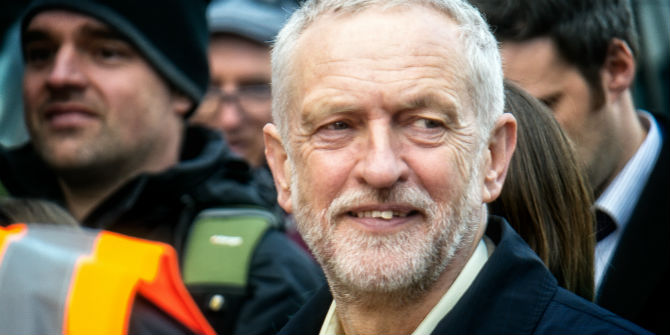 The EU referendum has been criticised at every stage, with the decision to hold a vote at all coming under as much criticism as the media coverage or the behaviour of the rival sides. Here, Angela Phillips argues that the BBC’s obsession with hearing from each side equally meant that the Conservatives received a great deal more media attention than did Labour, who unlike their rivals were largely united on the issue.
The EU referendum has been criticised at every stage, with the decision to hold a vote at all coming under as much criticism as the media coverage or the behaviour of the rival sides. Here, Angela Phillips argues that the BBC’s obsession with hearing from each side equally meant that the Conservatives received a great deal more media attention than did Labour, who unlike their rivals were largely united on the issue.
As Britain reflects on the fallout from the EU referendum, analysis from Loughborough University demonstrates that the BBC, in common with all other media, ignored concerns of Labour voters in favour of an entirely artificial notion of “balance” that was pitched as a ball-by-ball commentary of a Conservative power struggle.

Labour members canvassing in the streets and housing estates, waited in vain for the BBC – the country’s most trusted news source – to provide any serious analysis that could back up the Labour message on the doorstep. They had been expecting the BBC to deliver, as promised, “impartial and independent reporting of the campaign, providing them with fair coverage and rigorous scrutiny of the policies and campaigns of all relevant parties and campaign groups”.
Television is bound by rules of impartiality and the BBC is committed to ensuring that “a range of views is appropriately reflected” in its coverage. In spite of this, David Deacon, professor of communication and media analysis at Loughborough, found that all television channels covered the campaign in very much the same way as each other – and the press.
In the first month, up to June 8, the Labour Party had attracted a mere 6% of the campaign coverage on TV (less even than the 9% in the press). The Conservatives, meanwhile, grabbed 32% of the coverage.
For a brief period in mid-June, as former prime minister Gordon Brown entered the fray, Labour’s share of the political spotlight increased. But the interest in the Labour message was not sustained. In the final count of the frequency of appearances by media sector, Labour members figured in 10% of the TV coverage. The Conservatives provided almost 30%.
Blame Corbyn?
For many in the “Labour In” campaign, the problem was the lukewarm approach taken by Labour leader Jeremy Corbyn. He was criticised by campaign leader and veteran MP Alan Johnson, for “actively undermining the party’s efforts”.
However, by the end of the campaign, Corbyn had made 6.1% of all media appearances while Johnson figured in less than 1%. Given that accounts of the campaign suggest Johnson was far more actively engaged than Corbyn, this points to an editorial decision to ignore Labour Party campaigners in favour of highlighting what felt like the more high-profile battle between the Conservative “big beasts”.
By the later stages of the campaign, when it had begun to be clear that the final decision now rested on the votes of Labour voters in the old industrial heartlands, simple journalistic nous might have encouraged the BBC’s political team to find out what issues were likely to influence this key constituency and to seek out those politicians who represented them. Anecdotal evidence, that was not reflected in news bulletins, suggested that activists were finding a frustrating lack of knowledge about the campaign and Labour’s position on the doorsteps.
Crucial concerns ignored
By focusing entirely on the Conservatives, the BBC failed to address the concerns of a very large section of its audience. The editorial team appeared not to understand that concerns about the impact on the economy and the City would not register with people for whom the City is considered to be directly responsible for the recession, austerity, job losses and the benefit curbs that came with it.
Links could have been made with the issues that the Labour Party wanted to focus on: jobs, employment rights, the health service and prices, but these topics barely made the news agenda. By June 22, employment had received 3.4% of the television coverage and health garnered 1.7%. The possibility of rising prices didn’t figure at all. By far the biggest category, with 28.9% of coverage, was the conduct of the campaign itself.
The BBC’s assistant political editor, Norman Smith, justified this approach on its Radio 4 Feedback programme by explaining:
We are there to report what the main combatants in this referendum say, do, argue. I don’t think it’s up to us to, as it were, go AWOL and say well, fine, but we’re actually going to talk about this because we think that’s what voters are interested in.
Really not cricket
The decision to cover the referendum as though it were a cricket match, rather than a complex event in which every viewer and listener was actually a participant, rather than an observer, meant that in the days before the vote, fewer than a third of voters felt well, or very well, informed about their vote. There has already been a lot of concern expressed at the failure of the BBC to address the obvious lies being peddled in the campaign and the decision to give each side the opportunity to rebut any attempt by experts to correct such misinformation.
There needs also to be a thorough review of the decision by the BBC to interpret balance in a way which simply ignored the interests of working class viewers and listeners, casting them as observers rather than participants in the campaign.
While it is true that social media was important in consolidating the Leave campaign, it is also true that most of what is circulated on social media (whatever the platform) originates in the mainstream. The BBC is not only the most watched, it is also the most shared, news source. Audiences cannot watch or share information that isn’t there.
![]() This article was originally published on The Conversation. Read the original article. It represents the views of the author and not those of the BrexitVote blog or the LSE.
This article was originally published on The Conversation. Read the original article. It represents the views of the author and not those of the BrexitVote blog or the LSE.
Angela Phillips is a Professor in the Department of Media and Communications at Goldsmiths, University of London.






